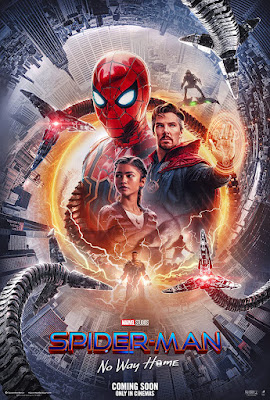aka 'It is, ultimately, better to let people die than to try and help them.' Wait? Is that really what the movie's telling me?
Recently, I watched Spider-Man: No Way Home. It was the first MCU movie I didn't catch in the theater. But after the experience of Far from Home, which I was ambivalent to, and Endgame, which I did not like at all, I was in no rush to see this one.
Spoilers from now on, I guess.
Also, forgive me if I sound bitter. If you enjoyed this movie, this post is not for you.
So now I finally sat down to watch it, with the promise of at least seeing Tobey Maguire and Andrew Garfield as well as old villains reprising their roles. At the very least that would be enjoyable, I thought.
And I was right. That was enjoyable. However, almost nothing else was. What made this movie almost unbearable for me, was its contradictory messaging that ruined any theme it could have had.
It seems like the basis for this movie was mainly, 'we can have the other Spider-Men and characters from the Sony franchises, we should do something with that!' with a dash of 'need to further establish the multiverse'. This is not unusual for the newer MCU movies and although I don't like it, it would not have bothered me this much if that had been all it was.
Unfortunately, they attempted to throw in a 'Peter learns about responsibility and consequences'-lesson that backfired spectacularly.
Okay. Before I explain my issues, a quick rundown of the movie:
- The world now knows that Peter is Spider-Man and a large chunk believes that he really did kill Mysterio. That is not good. In fact, it costs him (and MJ and Ned) their ticket to MIT.
- Upset about that, Peter turns to Doctor Strange to ask him to make people forget he's Spider-Man. While Strange is casting the spell, Peter changes his mind multiple times about who should remember the secret which messes up the spell and breaks open the multiverse.
- The villains arrive and start causing havok. With the help of Strange's magic they catch them easily.
- Strange wants to send them back immediately but in the meantime Peter found out that at least three of them would for sure die if he sent them back. Because May insists he help them, Peter stops Strange from sending them back and instead attempts to cure them of whatever made them evil.
- They manage to cure Dr. Octopus but then Green Goblin destroys the building and kills May who chooses her last moments to underline her earlier point about needing to help the villains and 'with great power comes great responsibility'.
- Peter meets the other Spider-Men and they fight the villains, managing to cure each of them.
- But 'oh, no! the multiverse is open now and everone who knows Peter Parker is Spider-Man will come through unless we make everyone forget who Peter Parker is'. So that's what they do.
- The end.
Now, this is already a lot. But what struck me immediately, is that the moral the movie wants us to take away is not the one it presents.
May here insists to her death that Peter is responsible for the villains. She tells him in no uncertain terms that sending them back to their realities to die is morally wrong and he instead has a duty to help cure them and thus ensure the possibility for a happy life. That is, out of context, a reasonable message: Everyone deserves a chance at redemption. I can get behind that.
However. The context the movie provides instead turns the message into 'attempting to help only makes your life worse' or maybe 'don't get mixed up in other people's matters and if they die they die' or as Green Goblin states 'no good deed goes unpunished'.
Because Peter's attempt to help the villains is directly responsible for destruction, injuries, May's death and everyone forgetting who he is*. Had he allowed Strange to send the villains back - like he wanted to originally, none of the tragedy of this movie would have happened.
'With great power comes great responsibility' works in the Spider-Man origin because uncle Ben dies because Peter does not take action (responsibility). Here, he does take action (responsibility) - in the way May wants him to - and she dies because of that, turning her statement on its head.
Inreasingly, the actions of the MCU superheroes leave the world in worse shape than they found it and so it is with this movie. Peter directly causes all the drama in this movie because he did not get into college. Oh yeah, and Doctor Strange casually tampers with space-time and people's minds to help a kid with his impulsive plan. It just doesn't mean anything. Spider-Man is good because he is a little guy suddenly thrust into having power which he uses to help the little guy. He is 'your friendly neighborhood Spider-Man'. This movie really shows how the MCU uses the classic Spider-Man beats without understanding why they worked - or, more likely - not caring in the least.
And that is - apart from absolutely horrific production issues (excessive use of CGI instead of costumes, sets, props and practical effects; spoiler-mania forcing actors to read lines in isolation; movies being planned out almost fully years in advance) - what truly makes recent MCU movies so soulless.
Satori over and out
* Also like. not to try and take this mess seriously, but would this spell - to affect the people coming over from the other universes - not also make everyone in these universes forget who Peter Parker is. And therefore also affect the loved ones of all other Peter Parkers? Much to think about.
Don't even get me started that people still know who Spider-Man is. The implication being that everyone would still remember everything they did with Spider-Man (considering that J Jonah Jameson, who knew Peter Parker was Spider-Man still remembers Spider-Man's existence and that he's responsible for the destruction). So MJ and Ned would AT LEAST remember the things they did with Peter as Spider-Man just not that Peter existed. Also did the spell erase all video, photo, documents and related objects (like the shrine at the school)? It seems like it but damn. Also also people still remember May was connected to Spider-Man? How do they think she was connected to him? Where did Peter get an ID from and anything needed to rent a flat? Yeah, I know, I shouldn't attempt to make sense of this.











